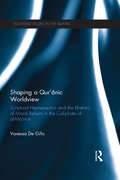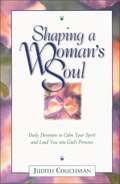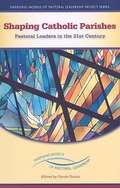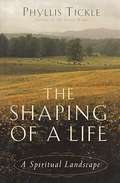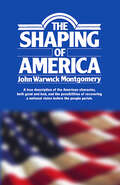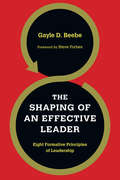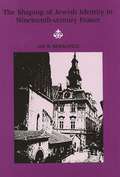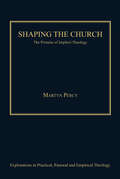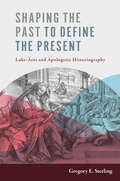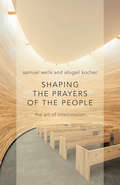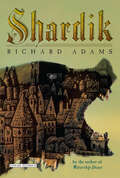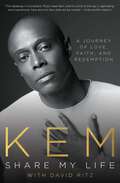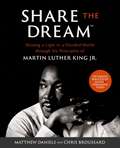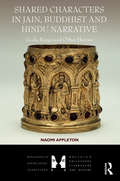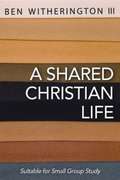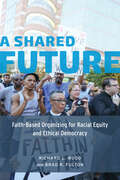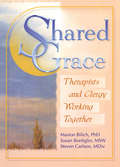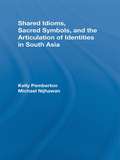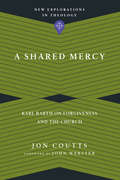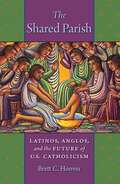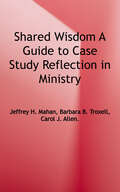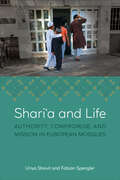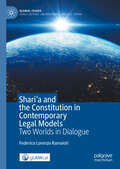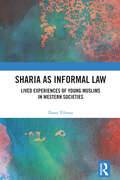- Table View
- List View
Shaping a Qur'anic Worldview: Scriptural Hermeneutics and the Rhetoric of Moral Reform in the Caliphate of al-Ma'ūn (Routledge Studies in the Qur'an)
by Vanessa De GifisExploring the subjectivity of the Qurʾān’s meaning in the world, this book analyses Qurʾānic referencing in Muslim political rhetoric. Informed by classical Arabic-Islamic rhetorical theory, the author examines Arabic documents attributed to the ʿAbbāsid Caliph al-Maʾmūn (r. 813-833), whose rule coincided with the maturation of classical Islamic political thought and literary culture. She demonstrates how Qurʾānic referencing functions as tropological exegesis, whereby verses in the Qurʾān are reinterpreted through the lens of subjective experience. At the same time socio-historical experiences are understood in terms of the Qurʾān’s moral typology, which consists of interrelated polarities that define good and bad moral characters in mutual orientation. Through strategic deployment of scriptural references within the logical scheme of rhetorical argument, the Caliph constructs moral analogies between paradigmatic characters in the Qurʾān and people in his social milieu, and situates himself as moral reformer and guide, in order to persuade his audiences of the necessity of the Caliphate and the religio-moral imperative of obedience to his authority. The Maʾmūnid case study is indicative of the nature and function of Qurʾānic referencing across historical periods, and thus contributes to broader conversations about the impact of the Qurʾān on the shaping of Islamic civilization. This book is an invaluable resource for those with an interest in Early Islamic History, Islam and the rhetoric of contemporary Middle East regional and global Islamic politics.
Shaping a Woman's Soul
by Judith CouchmanWe are a generation of women bent on running. Hurry here. Scurry there. Sprint to the office. Hustle the kids. . . . God invites us to run to him and then stop running.' - Judith Couchman. As we rush to fulfill our roles as organizers, caretakers, and nurturers, we increasingly discover that it's time to slow down and consider the needs of our inner, spiritual self. It's time to develop our soul. Shaping A Woman's Soul encourages us to take a spiritual retreat with sixty beautifully written devotionals. Drawing from the wisdom of the Psalms, Judith Couchman invites our spirits to welcome God's loving caress, which molds us, forms us, and shapes us into women of inner strength and beauty-the women we were created to be.
Shaping Catholic Parishes: Pastoral Leaders in the Twenty-First Century
by Carole GanimCatholic parish life in the United States is changing. As a result, new organizational models are emerging: clustered parishes, large megachurches, one pastor overseeing multiple parishes, lay leadership... Pastoral leaders, ordained and lay, need to learn new skills and adopt new leadership styles to function effectively in this changing pastoral environment. Shaping Catholic Parishes looks at these changes from the pastoral leader's point of view. Twenty-two priests, deacons, religious, and lay people share first-person accounts of their experiences serving as pastoral leaders in these new situations and roles.
The Shaping of a Life: A Spiritual Landscape
by Phyllis TickleLively, entertaining, and inspiring, THE SHAPING OF A LIFE is in the tradition of the beloved bestsellers by Kathleen Norris and Anne Lamott,an intimate, lyrical, and thought-provoking memoir from one of the most respected and admired writers on religion in America today. In THE SHAPING OF A LIFE, Phyllis Tickle recounts her life with honesty and humor, richly conveying both the external events and the internal insights and emotions. She shares stories of her childhood in eastern Tennessee as the only child of the dean at the local college—including her first inkling of the power and comfort of prayer and her realization that prayer required a disciplined routine, that it is "best practiced by a composed mind and spirit. " She writes of the sense of freedom and independence she discovered at college, where she fell in love with the language and the teachings of The Book of Common Prayer and decided to leave the Presbyterianism of her childhood and join the Episcopal Church. As Tickle chronicles her deepening understanding of prayer and the rewards of marriage, family, and a spiritual life, she reaches across the boundaries that separate one denomination from another and presents a portrait of spiritual growth and transformation that will appeal to devout practitioners and their less religious neighbors as well. Within a very personal story, Tickle reveals the keys that will help readers of all faiths find the path that leads from the everyday world of "doing" to the special place of simply "being. "
The Shaping of America: A True Description of the American Character, Both Good and Bad, and the Possibilities of Recovering A National Vision Before the People Perish
by John Warwick MontgomeryA critique of American ideas. The first half of the book deals with how America became the nation that it is; the second half suggests how it could become the nation that it should be. "Every Christian interested in the welfare of his or her country should read this excellent volume." (Robert G. Clouse, Department of History, Indiana State University)
The Shaping of an Effective Leader: Eight Formative Principles of Leadership
by Gayle D. BeebebothThe Effective Executive.
The Shaping of Jewish Identity in Nineteenth–Century France
by Jay R. BerkovitzNineteenth-century French Jewry was a community struggling to meet the challenges of emancipation and modernity. This struggle, with its origins in the founding of the French nation, constitutes the core of modern Jewish identity. <P><P> With the Revolution of 1789 came the collapse of the social, political, and philosophical foundations of exclusiveness, forcing French society and the Jews to come to terms with the meaning of emancipation. Over time, the enormous challenge that the emancipation posed for traditional Jewish beliefs became evident. In the 1830s, a more comprehensive ideology of régénération emerged through the efforts of younger Jewish scholars and intellectuals. A response to the social and religious implications of emancipation, it was characterized by the demand for the elimination of rituals that violated the French conceptions of civilisation and social integration; a drive for greater administrative centralization; and the quest for inter-communal and ethnic unity. In its various elements, regeneration formed a distinct ideology of emancipation that was designed to mediate Jewish interaction with French society and culture. <P><P> In this book, Jay Berkovitz reveals the complexities inherent in the processes of emancipation and modernization, focusing on the efforts of French Jewish leaders to come to terms with the social and religious implications of modernity. All in all, his emphasis on the intellectual history of French Jewry provides a new perspective on a significant chapter of Jewish history.
Shaping the Church: The Promise of Implicit Theology (Explorations In Practical, Pastoral And Empirical Theology Ser.)
by Martyn PercyThis book seeks to dynamically alter the way that theologians, ecclesiologists, students of religion and ministers look at the church. Taking the ideas of composition, formation and vocation as basic ecclesial categories, Martyn Percy explores how apparently innocent and incidental material is in fact highly significant for the shaping of theological and ecclesiological horizons. The Introduction sets the tone, with a meditation on how the apparently ordinary scent of a country church can be redolent with meaning, setting the tone of expectation in relation to subsequent worship. This book is not, however, simply about reading meanings into events, ideas, conversations and contexts. Rather, it sets out to faithfully interpret much of the material that surrounds us, yet is often taken for granted, or more usually unnoticed. The book is an invitation to involve the scholar or minister, paying close and patient attention to beliefs, language, artefacts, rituals, practices and other material - all of which are constitutive for ecclesial life and theological identity.
Shaping the Past to Define the Present: Luke-Acts and Apologetic Historiography
by Gregory E. SterlingUncovering ancient texts and rethinking early Christian identity with the Gospel of Luke and the Acts of the ApostlesShaping the Past to Define the Present comprises both new and revised essays by esteemed New Testament scholar Gregory E. Sterling on Jewish and early Christian historiography. A sequel to his seminal work, Historiography and Self-Definition, this volume expands on Sterling&’s reading of Luke-Acts in the context of contemporary Jewish and Greek historiography. These systematically arranged essays comprise his new and revised contributions to the field of biblical studies, exploring: the genre of apologetic historiography exemplified by Josephus and Eusebiusthe context of Josephus&’s work within a larger tradition of Eastern historiographythe initial composition and circulation of Luke and Actsthe relationship of Luke-Acts to the Septuagintthe interpretation of the Diaspora in Luke-Actsthe structure of salvation history as it is manifested in Luke-Acts Socratic influences on Luke&’s portrayal of Jesus&’s deaththe early Jerusalem Christian community as depicted in Acts compared with other Hellenized Eastern traditions such as Egyptian priests and Indian sagesthe establishment of Christianity&’s &“socially respectability&” as a guiding purpose in Luke-Acts Engaging with current critical frameworks, Sterling offers readers a comprehensive analysis of early Christian self-definition through Judeo-Christian historiography.
Shaping the Prayers of the People: The Art of Intercession
by Samuel Wells Abigail KocherThis book offers a model of profound and accessible congregational prayer. At once inspirational and practical, it will empower and equip laypeople and clergy alike to offer heartfelt, informed, and appropriate prayers on behalf of the people of God. As Samuel Wells and Abigail Kocher say, "Interceding in public worship is a duty. This book is intended to make it a joy."Shaping the Prayers of the People begins by considering what public prayer is and offering practical guidelines for avoiding common pitfalls. It explores prayer as an integral part of worship and discusses the language we need (and don't need) to address God. Significantly, the book also provides an array of example prayers along with commentary.
The Sharīca and Islamic Public Law in Time of War and Peace
by M. Cherif BassiouniThis innovative and important book applies classical Sunni Muslim legal and religious doctrine to contemporary issues surrounding armed conflict. In doing so it shows that the shari'a and Islamic law are not only compatible with contemporary international human rights law and international humanitarian law norms, but are appropriate for use in Muslim societies. By grounding contemporary post-conflict processes and procedures in classical Muslim legal and religious doctrine, it becomes more accessible to Muslim societies who are looking for appropriate legal mechanisms to deal with the aftermath of armed conflict. This book uniquely presents a critique of the violent practices of contemporary Muslims and Muslim clerics who support these practices. It rebuts Islamophobes in the West that discredit Islam on the basis of the abhorrent practices of some Muslims, and hopes to reduce tensions between Western and Islamic civilizations by enhancing common understanding of the issues.
Shardik
by Richard AdamsIn a bitterly divided world, a giant bear becomes an object of worship in &“the extraordinary fantasy novel by the author of Watership Down&” (The Guardian, UK). In a burning forest, Kelderek the hunter encounters a gigantic bear unlike any he&’s seen before. Surely this is the reincarnation of Lord Shardik, the messenger of god whose return has been anticipated by the primitive Ortelgan people. In service to Shardik, Kelderek becomes a prophet, then a soldier, and finally an emperor-priest. Swept up by fate and his impassioned faith, Klederek will come to discover ever-deeper layers of meaning implicit in the bear&’s divinity. Written after his bestselling debut novel Watership Down, Richard Adams&’s Shardik is an epic fantasy of tragic character. A fascinating depiction of the power of belief, it explores themes of faith, slavery, and war.
Share My Life: A Journey of Love, Faith and Redemption
by KemGrammy Award–nominated artist Kem shares his life in this revealing and remarkable memoir tracing his transformative journey from homelessness to gold-selling artist. Known for his smooth affecting crooning and dapper style, Kem&’s journey to the stage is nothing short of inspiring. In Share My Life, Kem goes back to the very beginning before his time to introduce his grandmother who worked as a sharecropper in the South and had thirteen children. As Kem&’s family rises from the sharecropping and ultimately lands in Detroit, there is an unspoken mantra of &“hard things are better left unsaid,&” which has devastating consequences down the line. And so, Kem grows up in the midst of an impenetrable silence. His mother is never without a beer in her hand, and his relationship with his father is oddly tense. Emotionally starved, Kem internalizes harmful feelings, eventually spiraling to drug use in his search for relief. At nineteen, Kem is homeless, roaming the cold Detroit streets. In the overly bright AA halls, Kem comes across men like himself verbalizing their feelings. The meetings helped him discover his own voice, using music as an outlet that has since touched millions. In Share My Life, Kem chronicles his incredible journey of self-discovery. The young boy who struggled with feelings of worthlessness becomes a man willing to put everything on the line for his dream.
Share the Dream Bible Study Guide plus Streaming Video: Shining a Light in a Divided World through Six Principles of Martin Luther King Jr.
by Matthew Daniels Chris BroussardIt&’s Time to Share the Dream. . .Dr. King and the men and women around him were able to change history through the power of a dream that was not rooted in mere human principles. That dream was rooted in the love of God for all his children made in his image.Share the Dream™ is a six-session video Bible study (streaming code included) based on the life and teachings of Dr. Martin Luther King, Jr. Each session revolves around one of the biblical principles that shaped Dr. King's life and motivated him to speak on behalf of African Americans in the Civil Rights Movement.Sessions and video run times:Love (24:00)Conscience (16:00)Justice (17:30)Freedom (14:30)Perseverance (15:00)Hope (17:00)Be a part of the Share the Dream™ movement that's helping a new generation understand, live, experience, and form a community around the unifying principles at the heart of the dream to which Dr. King dedicated his life.This study guide has everything you need for a full Bible study experience, including:The study guide itself—with discussion and reflection questions, video notes, and a leader's guide.An individual access code to stream all video sessions online. (You don&’t need to buy a DVD!) Streaming video access code included. Access code subject to expiration after 12/31/2028. Code may be redeemed only by the recipient of this package. Code may not be transferred or sold separately from this package. Internet connection required. Void where prohibited, taxed, or restricted by law. Additional offer details inside.
Shared Characters in Jain, Buddhist and Hindu Narrative: Gods, Kings and Other Heroes (Dialogues in South Asian Traditions: Religion, Philosophy, Literature and History)
by Naomi AppletonTaking a comparative approach which considers characters that are shared across the narrative traditions of early Indian religions (Brahmanical Hinduism, Jainism and Buddhism) Shared Characters in Jain, Buddhist and Hindu Narrative explores key religious and social ideals, as well as points of contact, dialogue and contention between different worldviews. The book focuses on three types of character - gods, heroes and kings - that are of particular importance to early South Asian narrative traditions because of their relevance to the concerns of the day, such as the role of deities, the qualities of a true hero or good ruler and the tension between worldly responsibilities and the pursuit of liberation. Characters (incuding character roles and lineages of characters) that are shared between traditions reveal both a common narrative heritage and important differences in worldview and ideology that are developed in interaction with other worldviews and ideologies of the day. As such, this study sheds light on an important period of Indian religious history, and will be essential reading for scholars and postgraduate students working on early South Asian religious or narrative traditions (Jain, Buddhist and Hindu) as well as being of interest more widely in the fields of Religious Studies, Classical Indology, Asian Studies and Literary Studies.
A Shared Christian Life
by Ben Witherington IiiThis book is for is for everyday Christians who seek to love God and offer charity toward others by celebrating spiritual practices in their congregation. It is meant to encourage you to be an integral part of the body of Christ --working and serving together, loving God with hearts but also with hands and feet--to be formed as a disciple of Jesus Christ. In the Wesleyan tradition, we believe that Christian formation happens best "when two or more are gathered." So focus is the body of Christ gathered--worshiping; sharing, learning, fellowshipping, taking Holy Communion, and doing works of piety and charity--together. In addition, a relationship with God is not primarily an individual's lonely personal quest for transcendence. It is not about becoming more self-centered, more self-focused, but it is about becoming more self-forgetful. The book outlines spiritual practices that involve individual and congregational transformation through learning and loving, fellowship and worship, by being lifted up in spirit and being enlightened in mind. A normal Christian life needs balance not only between work and rest and play, but also between worship, sacraments, doing, and learning. It needs balance between being alone with God and time with significant others.
A Shared Future: Faith-Based Organizing for Racial Equity and Ethical Democracy
by Richard L. Wood Brad R. FultonFaith-based community organizers have spent decades working for greater equality in American society, and more recently have become significant players in shaping health care, finance, and immigration reform at the highest levels of government. In A Shared Future, Richard L. Wood and Brad R. Fulton draw on a new national study of community organizing coalitions and in-depth interviews of key leaders in this field to show how faith-based organizing is creatively navigating the competing aspirations of America's universalist and multiculturalist democratic ideals, even as it confronts three demons bedeviling American politics: economic inequality, federal policy paralysis, and racial inequity. With a broad view of the entire field and a distinct empirical focus on the PICO National Network, Wood and Fulton's analysis illuminates the tensions, struggles, and deep rewards that come with pursuing racial equity within a social change organization and in society. Ultimately, A Shared Future offers a vision for how we might build a future that embodies the ethical democracy of the best American dreams.
Shared Grace: Therapists and Clergy Working Together
by Susan Bonfiglio Harold G Koenig Marion A Bilich Steven D CarlsonLearn how theology and psychology can work together to provide effective therapy!Shared Grace provides a framework within which mental health professionals and clergy can work together to provide people in need with appropriate psychological services and spiritual interventions. Breaking down the walls between psychology and religion, this guide offers you proven and tried methods and models from the authors’collaborative work. Comprehensive and intelligent, this vital book will help therapists incorporate a spiritual dimension to their sessions and give patients successful and effective services.Shared Grace is also a book about the healing power of love. It is the very personal, intense account of the authors&’ work to help a woman who suffered from dissociative identity disorder heal from the effects of her childhood abuse. Through this poignant story, you&’ll find that adding a spiritual dimension into psychotherapy brings increased richness and depth to the therapeutic process. Step-by-step practical suggestions for collaboration between therapist and clergy are included. Issues brought to light in Shared Grace include: transforming damaged and dysfunctional images of God the establishment of support systems within the religious community the use of guided imagery the creation of healthy rituals and ceremoniesShared Grace will help therapists and clergy alike and enable each to obtain the support, education, and training to make interdisciplinary collaboration successful.
Shared Idioms, Sacred Symbols, and the Articulation of Identities in South Asia (Routledge Studies in Religion)
by Kelly Pemberton Michael NijhawanHow do text, performance, and rhetoric simultaneously reflect and challenge notions of distinct community and religious identities? This volume examines evidence of shared idioms of sanctity within a larger framework of religious nationalism, literary productions, and communalism in South Asia. Contributors to this volume are particularly interested in how alternative forms of belonging and religious imaginations in South Asia are articulated in the light of normative, authoritative, and exclusive claims upon the representation of identities. Building upon new and extensive historiographical and ethnographical data, the book challenges clear-cut categorizations of group identity and points to the complex historical and contemporary relationships between different groups, organizations, in part by investigating the discursive formations that are often subsumed under binary distinctions of dominant/subaltern, Hindu/Muslim or orthodox/heterodox. In this respect, the book offers a theoretical contribution beyond South Asia Studies by highlighting a need for a new interdisciplinary effort in rethinking notions of identity, ethnicity, and religion.
A Shared Mercy: Karl Barth on Forgiveness and the Church (New Explorations in Theology)
by Jon CouttsChurch DogmaticsA Shared Mercy
The Shared Parish: Latinos, Anglos, and the Future of U.S. Catholicism
by Brett C. HooverAsfaith communities in the United States grow increasingly more diverse, manychurches are turning to the shared parish, a single church facilityshared by distinct cultural groups who retain their own worship and ministries.The fastest growing and most common of these are Catholic parishes shared byLatinos and white Catholics. Shared parishes remain one of the few institutionsin American society that allows cultural groups to maintain their own languageand customs while still engaging in regular intercultural negotiationsover the sharedspace.Thisbook explores the shared parish through an in-depth ethnographic study of aRoman Catholic parish in a small Midwestern city demographically transformed byMexican immigration in recent decades. Through its depiction of shared parishlife, the book argues for new ways of imagining the U.S. Catholic parish as anorganization. The parish, argues Brett C. Hoover, must be conceived as botha congregation and part of a centralized system, and as onepiece in a complex social ecology. The Shared Parish alsoposits that the search for identity and adequate intercultural practice in suchparishes might call fornew approaches to cultural diversity in U.S. society, beyond assimilation ormulticulturalism. We must imagine a religious organization that accommodatesboth the need for safe space within distinct groups and for social networksthat connect these groups as they struggle to respectfully co-exist.
Shared Wisdom: A Guide to Case Study Reflection in Ministry
by Jeffrey H. Mahan Barbara B. Troxell Carol J. AllenThree authors well-acquainted in the area of field education evaluate events in ministry using case-study analysis. They outline the case process—preparing, presenting, and discussing a case—and analyze the implications of the process. Each chapter offers a biblical image which connects the case process with the dynamic Christian tradition. Readers will learn techniques for writing case studies and will come to understand how to use imagination and analogy to provoke theological reflection.
Shariʿa and Life: Authority, Compromise, and Mission in European Mosques
by Uriya Shavit Fabian SpenglerDrawing on five years of field studies in pragmatic- and dogmatic-inclined mosques across Europe, Shariʿa and Life explores how Muslims engage with shariʿa norms in general, and specifically with the challenges they face as Muslims living in majority non-Muslim societies. The book examines how fatwas (advice on shariʿa-related matters) are quested, negotiated, paraphrased, contested, or ignored in mosques, on the internet, and elsewhere. It also analyses individual strategies, external to religio-legal discourse, through which Muslims mitigate conflicts between interpretations of shariʿa and everyday life. Among the issues discussed in the book are financial transactions, education, the workplace, sports, electoral participation, Christmas greetings, proselytizing, and the legitimacy of choosing to live in a non-Muslim country. Shifting the focus from the authors and texts of fatwas to their recipients, Shariʿa and Life gives voice to those often left voiceless and demonstrates the great discretion and flexibility with which tensions between shariʿa and life are resolved.
Shari'a and the Constitution in Contemporary Legal Models: Two Worlds in Dialogue (Global Issues)
by Federico Lorenzo RamaioliThis comparative law book aims at formulating a new analytical approach to constitutional comparisons, assuming as a starting point the different legal perspectives implied in the (Sunni) Islamic outlook on the juridical phenomena and the Western concept of law, with particular reference to constitutionalism. The volume adopts a wider and comprehensive viewpoint, comparing the different ways in which the Islamic sharīʿa and Western legal categories interact, regardless of substantive contents of specific provisions, thus avoiding conceptual biases that can sometime affect present literature on the matter. The book explores the various dynamics subtended to the interactions between sharīʿa and Western constitutionalism, providing a new classification to the different contemporary models. The philosophical and legal comparisons are analyzed in a dynamic way, based on a wide range of contemporary constitutional systems, virtually encompassing all the States in which Sunni Islam plays a major cultural role, and taking also into consideration non-State actors and non-recognized actors."Published in cooperation with gLAWcal - Global Law Initiatives for Sustainable Development, Hornchurch, Essex, United Kingdom".
Sharia as Informal Law: Lived Experiences of Young Muslims in Western Societies
by Ihsan YilmazThis book takes a comprehensive approach to investigate how Sharia influences and manifests in the everyday lives of young Muslims, aiming to unravel the meaning and relevance of Sharia-driven laws and practices in English-speaking Western societies. By focusing on the grassroots level, it provides a deeper understanding of the lived experiences of Muslims and their relationship with Sharia. The presence of Muslims in Western countries has a long history, with recent waves of migration and conversions contributing to their increasing numbers. This study recognizes the diverse nature of the Muslim community, comprising both migrants and local converts, who have become integral parts of the pluralistic fabric of multicultural societies. The research draws on in-depth interviews with 122 young Muslim individuals from diverse backgrounds representing three different Western countries: Australia, the United States, and the United Kingdom. Diversity of participants allows for a broader exploration of the Muslim community and the inherent diversity of opinions, interpretations, and practices regarding Sharia. This approach moves beyond theoretical debates, providing concrete insights into the practical implications of Sharia for young Muslims in their respective Western contexts. The book also sheds light on the evolving landscape of information and knowledge acquisition in the age of digital technologies and cyberspace. It explores how young Muslims access and seek knowledge in the twenty-first century, recognizing the impact of changing sources and modes of information on their religious practices and beliefs. This aspect adds a valuable dimension to the study, capturing the dynamic nature of knowledge dissemination and acquisition among young Muslims in Western societies. The book will be fascinating reading for academics, researchers, and policy-makers working in the areas of Law, Political Science, Minority Studies, Religious Studies, and Islamic Studies.
